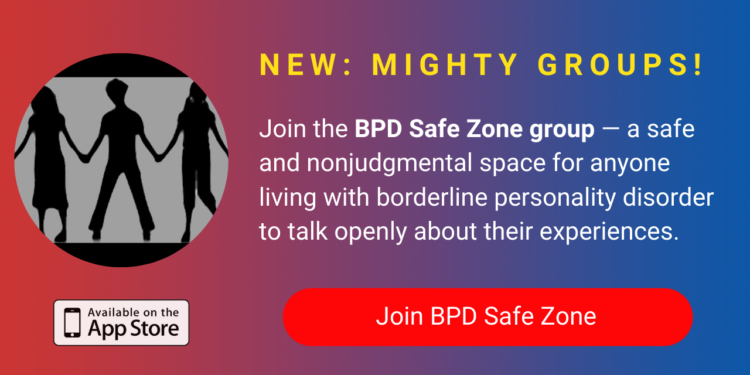6 ‘Frantic’ Things People With Borderline Personality Disorder Have Done to Avoid Abandonment
Editor's Note
If you struggle with self-harm or experience suicidal thoughts, the following post could be potentially triggering. You can contact the Crisis Text Line by texting “START” to 741741. For a list of ways to cope with self-harm urges, visit this resource.
Our world’s current status quo of social distancing and forced isolation has even the most introverted people wondering when it will be safe to see friends and family again. Even though many of us have found ways to stay connected through technology, we also might find ourselves questioning where we stand in many of our relationships and may even wonder if the people we haven’t heard from are abandoning us.
Before the COVID-19 pandemic even started, though, people with borderline personality disorder (BPD) lived with this constant fear of abandonment.
In the most basic sense, fear of abandonment is an overwhelming concern that people you love or feel connected to will leave. Although anyone can develop a fear of abandonment, people with borderline personality disorder frequently experience a strong fear of abandonment. In fact, the DSM-5 lists “fear of abandonment” as one of the nine tell-tale signs or symptoms of BPD.
Even when a relationship is going well, many of us with BPD wrestle with this pervasive fear that everyone we love will inevitably leave us or that we’re not worthy of friendship and love. Even though our fear of abandonment often seems irrational to others in our lives, it feels very real and completely unavoidable to us.
While I know exactly what my fear of abandonment causes me to do, I’m always curious to hear how this symptom impacts other people who live with borderline personality disorder. Thanks to The Mighty BPD community’s participation in this post, I was able to see how other people handle this pervasive fear that people in their life will leave.
Here are six “frantic” things that people with BPD have done to avoid abandonment:
1. Hide or withhold possessions.
“I put someone’s shoes under the shower to stop them from walking out during an argument. I was convinced if they walked out, I’d never see them again.” — Nell S.
“When I was little, I hid my sister’s tutor’s shoes so that she couldn’t leave and play with me instead. In my 20s, I threatened to throw away [my boyfriend’s] stuff if he didn’t come back ASAP.” — Christina S.
2. Shower people in lavish gifts.
“I bought my boyfriend of only a few weeks a weekend abroad to keep him interested, which I totally couldn’t afford.” — Jessica P.
“[Bought] nice gifts for the person when [I knew I didn’t] have the financial capabilities.” — Ayaka W.
“I would shower them in gifts, spending all the money I really didn’t have. I had to feel like I was ‘worth’ it for them.” — Ali H.
“My girlfriend broke up with me back in 2016, so I borrowed a roll of quarters from my mom (I was broke) and bought her favorite candy and energy drink, got down on one knee and asked her to be my girlfriend again. It didn’t work.” — Tara M.
3. Hurting yourself because it hurts too much.
“I overdosed, not to manipulate the other person, but because the emptiness of being rejected and abandoned was too much to stand.” — Rachel B.
“I’ve harmed myself multiple [so I would] end up in hospitals. I had concluded that people only cared and were at my side if I was hurting myself. [It’s] absolutely sad and embarrassing.” — Brianna R.
“I have made suicidal threats and attempts. It’s incredibly embarrassing after the fact. I wish my brain didn’t make me feel like it was necessary.” — Amy B.
4. Physically block people from leaving.
“Physically block them from trying to leave. [I’d] cling, cry until I could not breathe, and hold onto them.” — Pauline T.
“When I was young, I followed my ex-husband outside during an argument and got on the hood of his car so he couldn’t leave. Looking back on it, it was embarrassing and extremely dangerous, but in the moment I only felt pain and loss.” — Catherine R.
5. Text or post on social media excessively.
“I reach out through text and beg them to not leave.” — Tiffany L.
“[I] texted a friend 96 times in a row and begged them to please not leave, then cried and sent them a video apologizing for texting them 96 times. [I did this] all over the course of an hour or two.” — Kellyann N.
“I frantically post on social media when I feel like I’m being abandoned. [I know that] if my posts get likes then I’ll feel loved again.” — Elizabeth P.
“I’ll send long messages about how it’s OK if they don’t want to know me anymore, [but] all I want them to do is to confront me about it.” — Aleksandra K.
6. Push others away.
“I feel like I’m a burden [to] everyone I know so I’ve taught myself to just let people walk out, wish them well and emotionally disconnect from them immediately.” — Stefani S.
“I don’t get close to anyone anymore, and I detach myself from a person instantaneously if I [do]. I don’t let myself make friends, and I avoid acts of endearment or love… even toward my own family.” — Emma R.
“My frantic abandonment [avoidance] move is to push people away and cut them off first. At the first feeling that I am losing a person, I [grow] cold and prepare for them to leave.” — Nicole F.
“I usually start pushing them away, almost hurting them, so at least I know they will have a reason to abandon me.” — Maria S.
Although living with a constant fear of abandonment often feels overwhelming and impossible to ignore, I hope reading this helps you feel a little less alone. I know that I’ve personally engaged in several of these “frantic” efforts, and it’s comforting to know that I’m not the only one.
As I continue to make progress in my recovery, though, I have found ways to cope with my fear of being alone while also maintaining my own dignity. When I start to question if people care, I “check the facts” and even sit down and write out reframes for my intrusive anxious thoughts with thought records. I’m also learning how to express my feelings and concerns using “I Statements” so that I can let my friends know when I need validation without using passive-aggressive communication to get it. Finally, when my emotions consume me, I seek refuge in my bedroom and use distress tolerance skills to calm the storm inside.
If you struggle with a pervasive fear of abandonment, know that you’re not alone. If you ever need support or just a safe space to talk about how BPD impacts you, feel free to join us over in the Mighty Group BPD Safe Zone or post a Thought or Question using the hashtag #BorderlinePersonalityDisorder.
Remember that it’s OK to worry, but you don’t have to let that worry control everything you do.
Photo by Chi Lok TSANG on Unsplash


